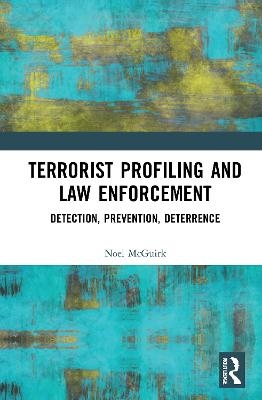
Terrorist Profiling and Law Enforcement
Routledge (Verlag)
978-0-367-43776-3 (ISBN)
It explores two main themes arising from the phenomenon of terrorist profiling: the lawfulness of terrorist profiling and the utility of profiling. These two themes are explored in three separate parts. Firstly, the book begins by drawing upon human rights concerns arising from the use of terrorist profiling by law enforcement officers. Secondly, an analytical framework capable of making determinations on the usefulness of terrorist profiling. This framework develops a profiling spectrum that ranges from formal and informal manifestations of terrorist profiling that forms the basis for evaluating its usefulness. Finally, the book presents an examination of various manifestations of terrorist profiling by separating the analysis of the ‘construction’ of profiles on the one hand, from their ‘application,’ on the other, so as to be able to identify and examine profiling’s usefulness as a technique to assist law enforcement officers make predictions about likely offender characteristics.
This book ultimately concludes that terrorist profiling should only be conducted by undertaking a systematic assessment of the construction of profiles separate from the application of profiles whilst simultaneously taking into account fundamental human rights concerns with the practice of terrorist profiling.
The work will be an essential resource for academics, law enforcement officers and lawyers in the disciplines of law, criminology, human rights, criminal justice and policing. As the book engages with terrorist profiling, it will also be of interest to those engaged in the psychology of terrorism.
Noel McGuirk is a Lecturer in Law specialising in terrorism law at Lancaster University Law School. Previously, Noel was a judicial research assistant at the Courts Service (Ireland) based in the Court of Appeal and worked on various research projects during his tenure. Noel’s research interests broadly focus on the relationship between terrorism, counterterrorism and human rights law. He is particularly interested in analysing legal responses to terrorism that have been adopted by various states to assist in preventing, detecting and deterring terrorism threats.
Chapter One: Introduction
Chapter Two: An Assessment of the Justification for the Inclusion of Sensitive Characteristics in Terrorist Profiling
Chapter Three: Criminal profiling and its Applicability to Terrorist Profiling
Chapter Four: Formal Terrorist Profiling: The Construction and Application of Terrorist Profiles
Chapter Five: Behavioural Profiling: The Construction and Application of Behavioural Profiles in the Context of Terrorism
Chapter Six: An Examination of Manifestations of Informal Terrorist Profiling
Chapter Seven: Conclusion
| Erscheinungsdatum | 24.02.2021 |
|---|---|
| Zusatzinfo | 5 Tables, black and white; 2 Line drawings, black and white |
| Verlagsort | London |
| Sprache | englisch |
| Maße | 156 x 234 mm |
| Gewicht | 521 g |
| Themenwelt | Geisteswissenschaften ► Psychologie ► Allgemeine Psychologie |
| Geisteswissenschaften ► Psychologie ► Sozialpsychologie | |
| Recht / Steuern ► EU / Internationales Recht | |
| Recht / Steuern ► Öffentliches Recht ► Völkerrecht | |
| Recht / Steuern ► Strafrecht ► Strafverfahrensrecht | |
| ISBN-10 | 0-367-43776-7 / 0367437767 |
| ISBN-13 | 978-0-367-43776-3 / 9780367437763 |
| Zustand | Neuware |
| Haben Sie eine Frage zum Produkt? |
aus dem Bereich


